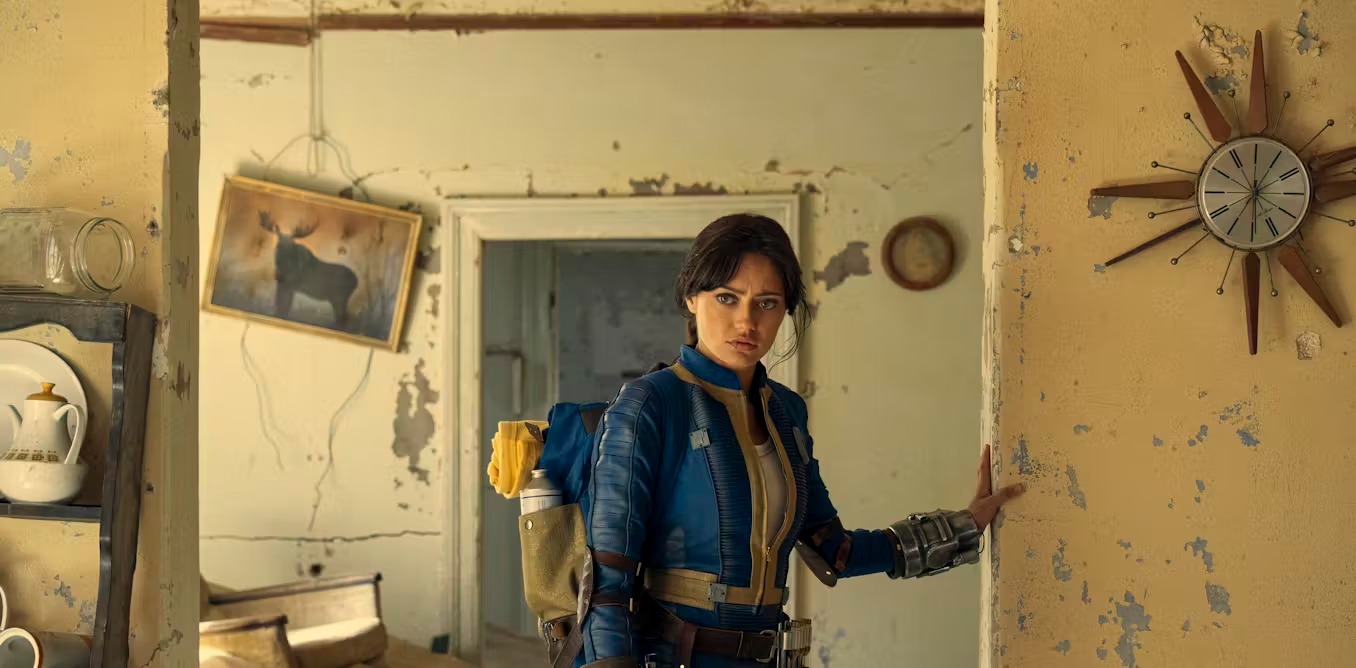Fallout is set in the Los Angeles “Wasteland”, 219 years after a global nuclear war devastated civilisation. Fortunately, the pre-war defence company Vault-Tec had developed a series of underground bunkers, called vaults, designed to ensure the continuation of American society in just such a scenario. Lucky, right?
The show follows three survivors. Lucy (Ella Purnell), a vault dweller leaves the safety of her bunker for the Wasteland to search for her missing father. Maximus (Aaron Moten), a rookie soldier in The Brotherhood of Steel, a paramilitary faction of surface-dwelling survivors, is sent on a mission to retrieve a pre-war artefact. And Cooper Howard (Walton Goggins), is a bounty hunter who has roamed the Wasteland for many years as a ghoul – a human mutated by radiation exposure – seeking a major prize.
The success of HBO’s The Last of Us adaptation in 2023 set a high bar for game-to-television adaptations. Fallout is a different kind of game though.
Where The Last of Us draws on source material from two games that already tell a structured, character-driven story, the five main Fallout games (alongside numerous spin-offs) are open-world role-playing experiences emphasising player choice. Each game has a main plotline, but their appeal is often found in exploration, side-quests and discovering information about the wider game world.
Translating this exploratory, player-driven experience into a linear television format has challenges. However, director Jonathan Nolan has said that he’s coming to this show as a fan, having been hooked on Fallout 3. And his deep understanding of the games is evident.
Watching the series as a fan of the games, I can see that essence of gameplay is woven into the scenarios, characters and cinematography. The show expands and develops the Fallout universe and lore, satisfying long-time fans while telling a compelling, standalone story accessible for newcomers.
Character creation and combat
While executive producer Graham Wagner wanted to refrain from overt use of game elements to avoid alienating non-gamers, game systems are cleverly embedded.
For example, in the game, Fallout players must create their character, assign values to different attributes and select secondary perks and skills, like faster weapon reloading or radiation resistance.
Lucy is introduced presenting herself as a candidate for marriage to a partner from a neighbouring vault. She mentions her repair, science, speech and rifle skills. Fans will appreciate this nod to character creation while the sequence still makes sense for non-gamers.
The approach to combat is also similar. The games’ combat features something called V.A.T.S. (Vault-Tec assisted targeting system) which freezes time, allowing players to target individual enemy body parts, before firing off shots in cinematic slow-motion.
The essence of V.A.T.S. is excellently captured in episode two’s shootout between the bounty hunter Cooper Howard (aka the Ghoul) and residents of the town of Filly. A combination of slow motion, bullet-tracking shot, and targeted attacks on heads and limbs will feel very familiar to fans. Howard’s character also seems to have opted for the “Bloody Mess” character perk judging by the exploding body parts.
You have discovered Vault 4
The season midpoint sees Lucy join forces with Maximus, a soldier of the Brotherhood of Steel faction. This pairing up mirrors the recruitment of companion characters in the games. Here, the series steps away from the “main questline” to pursue a side-quest. Seeking supplies, the duo venture into a ruined medical centre, promptly falling through a trapdoor into Vault 4.
A particularly memorable encounter for me from Fallout 3 was discovering Vault 108, where I was set upon by vault dwellers, all gleefully and eerily calling out the name “Gary”. Unpicking 108’s backstory was unsettling, darkly amusing and thought-provoking – a combination perfectly summarising the Fallout universe.
Watching Lucy and Maximus (mainly Lucy – Maximus is distracted by slippers and popcorn) unpick Vault 4’s story captures that same journey. From confusion to abject horror to empathy, delivered alongside some of the best comedic moments of the season, it’s wonderful to watch. This side-quest is a high point of the season, capturing the pleasure of discovering the weirdness of the world of the games while giving viewers a refreshing change of pace.
Before the bombs fell
The pre-apocalypse world is one of the most intriguing aspects of Fallout for me. The opening sequence of Fallout 4 gives a brief glimpse of this world but there is precious little opportunity to experience it first-hand in the games.
The games combine storytelling via character dialogue with epistolary narrative, a mode of storytelling using documents like letters, diaries and, now in our digital age, emails. Fallout makes extensive use of discoverable messages on computer terminals in the many ruined buildings across the Wasteland.
These frequently offer fascinating insight into the lives of people before the bombs fell. Yet I always wanted to see more of this pre-war US and get a look behind the curtain at just how the end of the world played out.
The flashback sequences in the new series are therefore a real treat for fans. They ooze the polished, optimistic, retro-futuristic vision of the US that Fallout 4’s introduction teases while maintaining a sense of conspiracy and unease bubbling away under the surface.
The plastic smiles, slick suits and can-do all-American demeanour of Vault-Tec employees and commercials are laid on thick. Meanwhile, television and radio broadcasts in the background describe key events in Fallout history, adding context for fans and joining together different aspects of Fallout lore. The time dedicated to these flashbacks is a real series strength, building to a franchise-defining revelation in the finale.



 Some ‘Star Wars’ stories have already become reality
Some ‘Star Wars’ stories have already become reality  Mexico Probes Miss Universe President Raul Rocha Over Alleged Criminal Links
Mexico Probes Miss Universe President Raul Rocha Over Alleged Criminal Links  How Marvel’s Fantastic Four discovered the human in the superhuman
How Marvel’s Fantastic Four discovered the human in the superhuman  BTC Flat at $89,300 Despite $1.02B ETF Exodus — Buy the Dip Toward $107K?
BTC Flat at $89,300 Despite $1.02B ETF Exodus — Buy the Dip Toward $107K?  Nasdaq Proposes Fast-Track Rule to Accelerate Index Inclusion for Major New Listings
Nasdaq Proposes Fast-Track Rule to Accelerate Index Inclusion for Major New Listings  Netflix’s Bid for Warner Bros Discovery Aims to Cut Streaming Costs and Reshape the Industry
Netflix’s Bid for Warner Bros Discovery Aims to Cut Streaming Costs and Reshape the Industry 
































